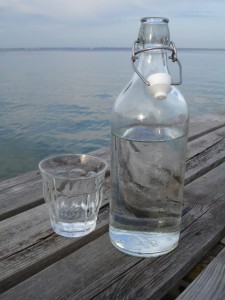 Are you feeling that 3 o’clock fatigue? Do you have a kind of niggling but not-quite-full-blown headache?
Are you feeling that 3 o’clock fatigue? Do you have a kind of niggling but not-quite-full-blown headache?
A glass of water might be a cheap cure-all.
Dehydration Causes Fatigue
Yep – a low water level can make you tired. Don’t you wish you had a dipstick to measure the water levels in your body – like you measure the level of oil in your car?
Even being mildly dehydrated can slow your metabolism, drain your energy, and make you feel tired.
There are some signs you can look for. In addition to feeling tired, with mild to moderate dehydration you might also:
- Have a dry, sticky mouth
- Be thirsty
- Not urinate as much
- Have fewer or no tears when you cry
- Have dry skin
- Headache
- Constipation
- Be dizzy or lightheaded
About 60% Of Your Body Weight Is Water
Water is the main chemical component in your body and accounts for about 60% of your body weight. Every system in your body depends on it.
You need water for the chemical and metabolic processes to take place in your body; for body fluids like tears, sweat, and urine; to flush toxins out of your vital organs; and to carry nutrients to your cells.
How Much Water Should I Drink?
There’s no easy answer to the question: “How much water should I drink?” The answer really depends on many things including:
- your health
- your age
- how active you are
- where you live
For the average healthy adult who lives in a temperate climate, the Institute of Medicine recommends around 3 liters (about 13 cups) of total water intake a day for men and 2.2 liters (about 9 cups) of total water intake a day for women.
What’s Total Water Intake?
Total water intake is not just plain water. It includes the plain water you drink, the water in all of your other beverages, and the water in your food. All fluids count toward your daily total.
On average, food supplies about 20% of your total water intake. Many fruits and vegetables — like watermelon, grapes, lettuce, and tomatoes — are 90% or more water by weight. Food from grains like oatmeal and pasta are also hydrating because they swell up with water when they’re cooked. Even meat is full of water.
Beverages like milk and juice are mostly made of water, too. Even beer, wine and caffeinated beverages — coffee, tea or soda — can contribute, but they shouldn’t be the major portion of your daily total fluid intake. Water is calorie-free, inexpensive, readily available and your best bet.